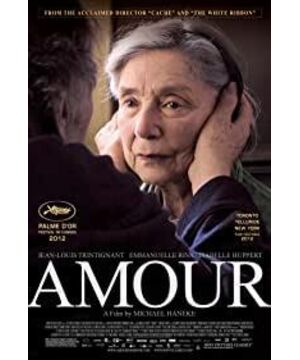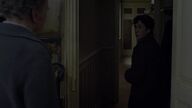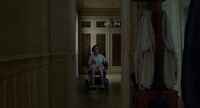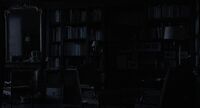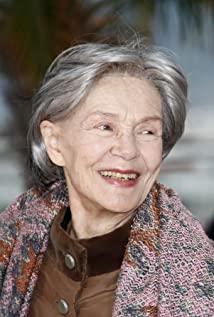* This article is partially inspired by
Wu Guanjun: "It's just that I was at a loss at the time" -Revisiting the Lacanism of "Lust and Caution" Ten Years Later"
Hanek's tenderness?
Huppel once commented on Hanek: "Every film is radical . " As she said, from the early glacier trilogy, to the "Fun Game" that offended the audience, to the sharp-edged "Piano Teacher" and "Hidden Camera" at the beginning of this century, and the "White Ribbon" that won the Palme d’Or. , Haneke has focused on criticism of modern society and the people of alienation hypocritical middle class life .
If you try to describe beauty, it immediately becomes a lie.
Most of his works implement the above principle mentioned in his interview on "The Seventy-one Fragments of Chronicles of Opportunity": there is no trace of beauty, let alone sensational whitewashing, but facing the cold reality and restraining the group. Receiving the fragments of time, occasionally releases calm violence and deep and decisive accusations.
However, in "Love and Adoration", we see Hanek's rare gentle face (the previous "Dead in Rebellion" is another affectionate work). In the presentation of the delicate relationship between the characters, it seems difficult for us to find the traces of the critical edge.
So, is this really just a work depicting "love"? Is the social observation and middle-class critique that Hanneck knows well before this is absent?
When we try to break out of the visual limitations of the two protagonists in the film, we may be able to discover a wider space and rediscover the definition of "love".
The body of love
At the beginning of the film, Haneke arranged a very unique fixed-length lens : from the stage to the auditorium, a completely regular axially symmetrical view of the center. Georges and Anne are seated on the left side of the camera at an intermediate distance. The lights dimmed, and outside the painting was the host’s crisp opening remarks, and the gentlemen and ladies in the seats ended their social exchanges, applauded neatly, and the melancholy sound of the piano sounded...
Hanneck has always been an extremely accurate creator of the sense of space. If we want to narrate the emotional relationship between the two, it is difficult for us to imagine what the effect of such a lens showing a huge space is. There is no doubt that the director observed the two old people in the context of the middle class. The whole scene not only reveals the elegance of the middle-class cultural and social places, but also highlights the regular, serious and even depressing ritual atmosphere of this community. The process of viewers being restrained by a fixed frame for a long time looking directly at this group is also a process of experiencing the discipline of human behavior in this place.
If you follow such logical thinking, then the emotions of the two protagonists will be placed in a certain group order from this shot . All subsequent depictions that are full of love may incorporate more complex influencing factors.
After the stage of the theater, all the scenes are confined to the apartment building. Whether it was the door of the room being broken by the police at the beginning, or the discussion about the thief breaking the door after the two went home; whether it was Georges walking out of the house in a nightmare and encountering a murderer in the corridor, and finally Georges blocking the door; regardless of the interspersed a lot of interior layout The empty scene of, or the daughter's inspection of the empty room at the end... All these seem to imply the importance of this space in maintaining the security and emotional stability of the two people's lives. It seems to have become a concrete package of the two people's lives. The concrete space echoes the abstract character psychology.
The film has constructed many supporting roles and the protagonist's relationship, and daughter Eva is an extremely important one. The first shot of my daughter has a strong sense of alienation. In the living room, Eva is on the left, his right face is facing the audience, Georges is on the right, and his left head is facing the audience. The two sat on the single sofa, keeping a respectful and friendly distance. The daughter talked about her life on her own, showing an awkward but polite smile from time to time- Yu Peier completely included her daughter's sense of "professionalism" as if reporting to work in the performance.
When referring to her next generation, her daughter inadvertently emphasized that they are "very independent." However, when Georges suddenly asked about her relationship status, Eva's reaction was slow. It is not difficult to see from this that what the daughter is used to showing in front of her father is a harmonious and free picture. Later, Eva mentioned eavesdropping on the voice of Georges having sex as a child, thinking that this is a sign that the family can "always be together". Whether it is unconsciously covering up in front of the father, or the "love" memories of the parents in childhood, they directly or indirectly maintain the integrity of the family.
Coincidentally, another character in this film, the neighbor (or friend?) Mr. Méry, after helping Georges move, also said to Georges: "My wife and I admire everything you do." Haneke never let it go. My own film is redundant. If the depiction of Georges and Anne's love is convincing enough, then what effect will such tendentious lines that echo back and forth (correspond to Eva's words) and repeat meaning? Is it just the simplest contrast?
Let us return to the context in the opening scene again: The significance of Georges and Anne lies not only in themselves, but also in the exemplaryness of their living conditions for the middle-class group they live in. And this represents not only simple spiritual power, but also related to the family's value system and life posture. In this moral paradigm: taking care, supporting and striving to return to a "elegant" and "dignified" life state is the most acceptable expression of love . When we recalled Anne’s student letter “May your life be back on track”, and contacted Eva for a long time wishing to see a doctor and nurse, we finally understood the intention of everyone around: aging and disease do not seem to be An acceptable state of life, and the behavior of Georges and Anne in their eyes is a measure to restore life to "normal".
Everyone around them objectively supports the integrity of this family-because this is an ideal model; and subjectively, this behavior is to maintain the balance of the inner moral system. Georges and Anne were so lonely—or perhaps, Anne was the loneliest person. Because even the person she loves the most is preventing her from making a choice.
Of course, Georges is not loveless to Anne, but this love is so questionable. Is Georges's retention of Anne out of intellectual concern for his life, or the selfishness of wanting to keep her by his side? Or a more secretive one: his love for her has unknowingly become a heavy shell under the middle-class life paradigm, binding her as well as the two of them.
Haneke practiced his creed in another way: describe beauty, and then don't tell you-that may be a lie.
"Love" itself
As mentioned in the previous section, Georges' various loving behaviors towards Anne seem to be based on the control and self-punishment of reason and selfish desire. Within this framework of love, there is no room for real "love" and freedom to be released.
Your mother hasn't improved as expected, and she's becoming more and more like a child at a loss. This is sad and shameful for me and her.
He locked Anne in the door, said to Eva, and finally rejected her offer. The problem of care is still inevitably coming, Anne's quality of life is still deteriorating, and Georges is getting more irritable and losing patience with Anne.
From another point of view, if the original state of accepting visitors of all colors is an openness to the context of their lives, the privacy of this space now gives them a greater degree of freedom-isolation at this time means instead. With autonomy. He increasingly refused outside support for him, and this also brought him closer to Anne: he became more and more aware of Anne's mentality of wanting to leave.
Understanding and resistance, these two extremely heavy mentalities are constantly clashing, but they are still limited in that body. Anne’s rare happy hour comes when she and Georges sing "On the Avignon Bridge": "On the Avignon Bridge, we dance in circles." The once-lived freedom of life is so far away, whether The autonomy to choose to break free is no longer in herself, but in Georges.
At this point in the discussion, the significance of Georges' final behavior seems to be heavier than imagined. He quietly recalled and talked about the torment of childhood in the summer camp: as if the person who painted the cards full of difficult times was Anne. When Anne's painful moan gradually subsided, he hesitated for a while, and suddenly covered her with a pillow-all this was in that instant.
At this moment, Georges and Anne broke through the usual framework of life, shattered the body of the once loved, and freed from the pain of a distant future. This middle-class family, which has been lingering for so long, finally collapsed in a decisive manner-and the cause of its collapse was not the external forces of modern society in all Hanneck’s previous works of similar themes, but the indescribable only "Love" broke out in an instant. That is no longer an empty shell. She has broken free from rational moral judgment and the control and construction of selfish desire, which is the "love" itself.
From the perspective of Haneke’s radicalness as always, the “love” that Georges’s behavior ultimately defines itself is the existence outside the body of reason and desire regulated by reality: this behavior destroys everything on the one hand. His previous care efforts, which he painstakingly maintained before, on the other hand broke through the emergence rituals that he had failed to completely reject. At that moment, he became a completely alien person, radiating a self-destructive force that surpassed himself and was never here: when he killed Anne’s life, his own life would also move towards Chaos and end.
Love is colder than death?
Georges saved both Anne and his own despair. He washed the flowers and spread them around Anne, as if she had let go of all the physical and spiritual torture, and returned to the holy and uninhibited quality of life. "Love is colder than death." This is perhaps one of the most common comments on "Love·Morrow". However, through the above analysis, I seem to have great doubts about this evaluation.
Is death cold? Is death also possible freedom worth admiring?
Is "love" cold? If there is no strong "love", why can death become sublime?
In "Love and Adoration", "life", which is so difficult to resist, is perhaps the coldest existence, but because of the salvation of "love", "death" becomes a great relief. "Love" breeds death, and death allows "love" to live forever.
This is indeed a work depicting "love", and it is probably indeed Hanek's most tender work.
View more about Amour reviews


